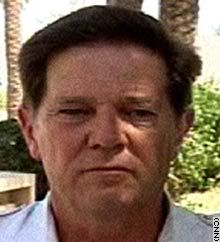 http://www.latimes.com/news/politics/la-na-ethics29apr29,1,2140990.story?coll=la-headlines-politics&ctrack=1&cset=true
http://www.latimes.com/news/politics/la-na-ethics29apr29,1,2140990.story?coll=la-headlines-politics&ctrack=1&cset=trueBy Mary Curtius, Times Staff Writer
WASHINGTON — After months of published reports raising questions about his overseas travels, House Majority Leader Tom DeLay (R-Texas) says he is looking forward to proving his innocence to a revived House ethics committee.
But even if the panel begins immediately, it is expected to take six months to a year to complete an investigation into DeLay's conduct — and there is no guarantee that either the House majority leader or the committee will emerge unscathed, legal experts say.
In this case, the stakes are particularly high, both for Mr. DeLay, given his history of ethics lapses, and for this committee," said Kathleen Clark, a law professor at Washington University in St. Louis who specializes in legal and government ethics.
She says the public will want to know this: "Will the committee be able to act in a bipartisan manner in the way that it has in the past?"
On Wednesday, DeLay characterized the forthcoming inquiry by the House Committee on Standards of Official Conduct as not so much a formal investigation of him, but as a chance to answer questions about his conduct while helping to guide the committee to clarify its rules on travel and gifts.
Asked whether he thought the existing rules were clear, he responded: "No, obviously not."
Experts say DeLay is likely to find himself entangled in a process that will be lengthy and carried out largely in secret — and it will be committee members, not DeLay, who will shape the scope of the investigation.
In order to establish its credibility, the panel "needs to take hold of this case and decide how it is going to proceed," said Kenneth A. Gross, a Washington lawyer who has informally advised legislators under investigation by the ethics committee.
If the DeLay investigation "is going to have any credibility," he said in a interview Thursday, "it needs to be shaped and controlled by the committee with some orderly process."
Under the most likely scenario, Reps. Doc Hastings (R-Wash.), the panel chairman, and Alan B. Mollohan of West Virginia, the ranking Democrat on the committee, will review the news reports and jointly notify DeLay that he is the subject of a preliminary investigation. At that point, Hastings and Mollohan may informally question DeLay and others.
If that informal inquiry raises enough questions, the full committee will be asked to vote to form an investigative subcommittee with the power to subpoena witnesses and documents.
At issue are several overseas trips by DeLay. Newspaper reports have alleged that a registered foreign agent paid for one, and that some of the expenses on another trip were put on the personal credit cards of two lobbyists.
Even if those allegations proved true, Gross said, none would seem serious enough to cost DeLay his leadership position — if he didn't already have a history with the committee.
"None of these trips are knocking my socks off," Gross said. "But there is a bleeding process that carries over from past admonishments that he's received."
Last year, the ethics committee, the only House panel evenly divided between Republicans and Democrats, unanimously admonished DeLay three times for his conduct.
"It is clearly necessary for you to temper your future actions to assure that you are in full compliance at all times with the applicable House Rules and Standards of Conduct," the committee wrote to him last fall.
It was after DeLay received that warning that news reports about his travels began to surface. Gross said the trip that may prove most problematic was a 10-day visit to England and Scotland in 2000.
The Washington Post has reported that Jack Abramoff, a Washington lobbyist under investigation by a Senate committee and the federal government for his dealings with Indian tribes, used his personal credit card to pay DeLay's airfare. House ethics rules prohibit members from allowing lobbyists to pick up their expenses.
The Post also reported that lobbyist Edwin A. Buckham, a former DeLay staffer, used his credit card to pay $184 of DeLay's expenses on the same trip.
DeLay's lawyer, Bobby Burchfield, said in an interview Thursday that DeLay "believed and continues to believe" that his trip to England and Scotland was paid for by a conservative think tank, the National Center for Public Policy Research, and not by lobbyists.
Burchfield said the ethics rules held that a member was only culpable if he knew that those paying the expenses were disallowed by House rules — and that DeLay had no such knowledge.
Questions have also been raised about a 2001 trip to South Korea. The Korea-U.S. Exchange Council paid for the trip, which began a few days after the organization registered as a foreign agent. House ethics rules prohibit foreign agents from financing trips for members of Congress. DeLay has said that he did not know the group had registered as a foreign agent.
There are also questions about a June 1997 trip to Moscow sponsored by the National Center for Public Policy Research. Published reports have questioned whether the trip was actually paid for by business interests.